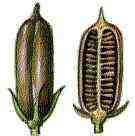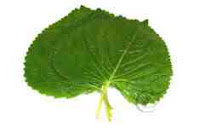 ods. "Open sesame," the famous phrase from the Arabian Nights, refers to the sesame seed pod, which bursts open when it reaches maturity.
ods. "Open sesame," the famous phrase from the Arabian Nights, refers to the sesame seed pod, which bursts open when it reaches maturity.It is an annual plant growing to 2-3 feet tall, with opposite leaves 5.5 inches long, and 2 inches broad. One to three flowers appear in the leaf axils. The fruit, about one inch long, is an oblong capsule with small seeds. Each plant may grow 15-20 fruits, which contain 70-100 seeds each. Plants and fruits will reach maturity in 80-100 days after sowing. When the seeds are ripe the capsule bursts open suddenly and scatters its seeds.

The majority of the wild species of the genus Sesamum are native to Africa. However the sesame seed was first domesticated in India. There is archaeological evidence that it was cultivated at Harappa in the Indus V
 alley between 2250 and 1750 BC, and more recent evidence of charred sesame seeds in Miri Qalat and Shahi Tump in the Makran region of Pakistan.
alley between 2250 and 1750 BC, and more recent evidence of charred sesame seeds in Miri Qalat and Shahi Tump in the Makran region of Pakistan.The word sesame is from Latin sesamum, "seed or fruit of the sesame plant". In northern India, there are two independent names for it: Sanskrit 'tila', and (Hindi/Urdu)'til'. Most of the Dravidian languages in South India feature an independent name for sesame eg 'ellu' and 'Nuvvulu'.
Sesame features in Urdu literature as the two proverbs show:"til dharnay ki jagah na hona"; meaning, ‘a place so crowded that there is no room for a single seed of sesame’, and "in tilon mein teil nahee" for a person who is very mean, meaning ‘there is no oil left in this sesame seed’.
Sesame is grown primarily for its oil-rich seeds which come in a variety of colours, from cream-white to charcoal-black. Sesame oil was the preferred cooking oil in India until the advent of groundnut (peanut) oil. Sesame seeds are highly valued for their oil because it is exceptionally resistant to rancidity. Sesame seeds are used the world over in numerous foods.
In Hindu mythology the god Yama (god of death) blessed the sesame seed and these tiny seeds are regarded throughout the East as symbols of immortality. The seed was supposed to have originated when drops of sweat trickled from Vishnu(Preserver god) and fell to earth. The seeds are symbolized as Vishnu's consort Lakshmi (goddess of prosperity).
A Hindu festival celebrated on the day the sun enters the zodiac sign (rashi) of Capricorn (Makar) is called Makar sankrant and lamps of sesame oil are lit in a temple to Lord Shiva, while devotees perform a rite for one's departed ancestors (pitrushraddha) or Tarpana, by making an offering of sesame. The use of sesame in an offering to ancestors (shraddha) prevents negative energies from posing obstacles in the rite. Since sesame seeds (or sesame oil) have an ability to absorb sattva vibrations, they facilitate smooth spiritual practice during this
 period.
period.According to an Assyrian legend, when the gods met to create the world, they drank wine made from sesame seeds. Women of ancient Babylon would eat halva, a mixture of honey and sesame seeds, to prolong youth and beauty, while Roman soldiers ate the mixture for strength and energy.
Not only are sesame seeds a very good source of manganese and copper, but they are also a good source of calcium, magnesium, iron, phosphorous, vitamin B1, zinc and dietary fibre. In addition to these important nutrients, sesame seeds contain two unique substances: sesamin and sesamolin. Both of these substances belong to a group of special beneficial fibres called lignans, and have been shown to have a cholesterol-lowering effect in humans, and to prevent high blood pressure and increase vitamin E supplies in animals. Sesamin has also been found to protect the liver from oxidative damage.
Sesame oil is used for massage and health treatments of the body in the ancient Indian ayurvedic system with the types of massage called abhyanga and shirodhara. Ayurveda views sesame oil as the most viscous of the plant oils and believes it is effective in health problems associated with Vata aggravation.
of the plant oils and believes it is effective in health problems associated with Vata aggravation.
Black sesame seed is builds Yin Jing, and therefore it is a longevity herb. In addition to its essence-building capacity, Black Sesame also builds blood. Black sesame seed is moistening to the intestines and helps move the bowels. It prevents and relieves constipation due to dryness of the intestines.
 of the plant oils and believes it is effective in health problems associated with Vata aggravation.
of the plant oils and believes it is effective in health problems associated with Vata aggravation.Black sesame seed is builds Yin Jing, and therefore it is a longevity herb. In addition to its essence-building capacity, Black Sesame also builds blood. Black sesame seed is moistening to the intestines and helps move the bowels. It prevents and relieves constipation due to dryness of the intestines.
Black and Golden Sesame Seeds are the un-hulled seeds. White Sesame Seeds are hulled seeds and are the most popular type to use in cooking.

No comments:
Post a Comment
readers are welcome to leave helpful comments and suggestions or herb stories of their own